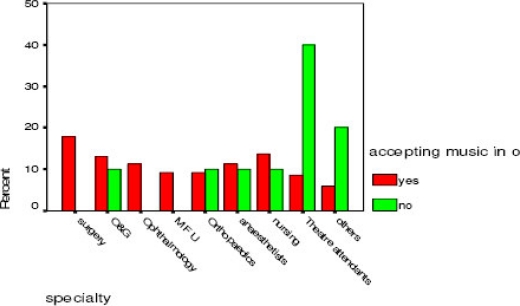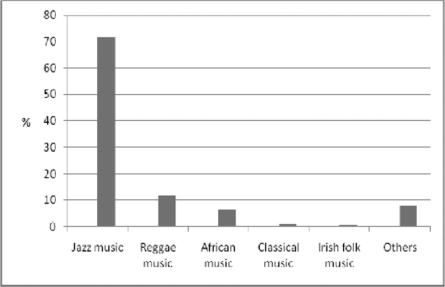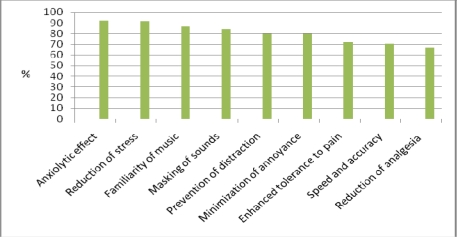Abstract
Background
The role of music during surgery has been studied, including its effect on theatre staff, users and patients. However, little attention has been paid to its application especially in our environment.
Methods
It was a prospective study, involving theatre staff, users, and patients. Their opinions on acceptability and the role of music in operating theatre were determined. Information was obtained by questionnaire.
Results
There were 162 respondents; age range 25 to 76 years (median age 39). There were 109 (67.2%) males and 53 (32.7%) female. One hundred and forty five (89.5%) respondents agree that music should be played in the operating theatre. One fifty eight, (97.5%) considered low tone of music to be most appropriate in the theatre while 3(1.9%), and 1(0.6%) considered moderate and high tone respectively to be most appropriate. One hundred and sixteen, (71.6%) preferred jazz music while 19(11.7%) reggae, 11(6.8%) African music, 13 (8.0%) others (not specify), 2 (1.2%) classical, and 1(0.6%) Irish folk. The majority of the respondents were aware of the role of music in terms of its anxiolytic effect, reduction of stress and enhancement of performance when familiar music is played.
Conclusion
Music in the operating theatre has immeasurable effects. It can prevent distraction, minimize annoyance, reduce stress and diminish the anxiety of patients, staff and users.
Keywords: Music, operating theatre, patients, Nigeria
Introduction
The role of music during surgery has been studied, both for its effect during the operation and afterwards, when patient recovers1,2. Patients may not know when music is being played during their procedure in the theatre. However, if they do, it has been shown to have an immeasurable effect and also rest their minds3,4. In fact, it is now known that some patients request for music to be played during their procedure4.
Operating theatre is said to be something of a mystery to most staff and users including those asleep on the operating table when music is being played4,5 inside. Despite the documented advantages and effect of music to all staff, users and anaesthesized patients' alike, playing music in the operating theatre especially in our environment is yet to receive attention.
This study explored the views of staff and users on the acceptability and role of music in the operating theatre.
Methods
This study was conducted by the use of a structured questionnaire to obtain the necessary information. The questionnaire was administered to the theatre staff (Nurses, theatre attendants) and users (the Surgeons, Obstetric and Gynaecologists, Ophthalmologist, Maxillofacial Surgeons, Orthopaedic Surgeons, Anaesthetists, and Patients). The questionnaire determines the duty of the respondent to the theatre and whether he or she accepts music to be played in the operating theatre or not. It also determines the most preferred type of music and the tone to be played. The knowledge of the effect of music to the staff, users and patients in terms of anxiolytic effect, enhancement of tolerance to pain, reduction of analgesia requirement by patients postoperatively, ‘masking’ effect on worrying sounds, enhancement of speed and accuracy of operating surgeon, prevention of distraction, minimization of annoyance, reduction of stress and whether familiarity of music has an enhanced effect were also determined.
Out of the 167 questionnaires administered, only 162 returned completed. Statistical analysis of the 162 were done (using SPSS version 11). Simple frequencies were determined for variables. The chi-square test was used to test for proportions. The critical level was set at 0.05 for all statistical tests.
Results
There were 162 respondents; age range was 25 to 76years (median age 39). There were 109 (67.2%) male and 53 (32.7%) female. There were 27(16.7%) surgeons, 21(13.0%) obstetric and gynaecologist, 17 (10.5%) ophthalmologists, 14 (8.6) maxillofacial surgeons, 15 (9.3%) orthopaedic surgeons, 18 (11.1%) anaesthetists, 22 (13.6%) Nurses, 17(10.5%) theatre attendants, 11(6.8%) others including patients that were assessed. One hundred and forty five (89.5%) respondents agree that music should be played in the operating theatre while only 17 (10.5%) disagree. No association between age and acceptability of music in the theatre. Both married and single respondents agreed that music should be played in the theatre with no significant statistical differences between the two. One fifty eight, (97.5%) considered low tone of music to be most appropriate in the theatre while 3(11.9%), and 1(0.6%) considered moderate and high tone respectively to be most appropriate. One hundred and sixteen, (71.6%) preferred jazz music while 19(11.7%) reggae, 11(6.8%) African music, 13 (8.0%) others (not specify), 2 (1.2%) classical, and 1(0.6%) Irish folk. The proportion of staff and users' with knowledge of therapeutic efficacy of music in the theatre revealed 151(93.2%) anxiolytic, 148(91.4%) reduction of stress, 140 (86.4%) familiarity of music played enhances performance, 136 (84.0%) masking worrying sounds, 129( 79.6%) prevention of distraction, 129(79.6%) minimizes annoyance, 116 (71.6%) tolerance to pain, 114(70.3%) effect on speed and accuracy, 108( 66.7%) reduction of analgesic requirements.
Discussion
The magic of sound, when scientifically applied, has been shown to contribute in greater measure to relief human suffering 1,2,5,6. Thus, music can be employed as an aid in obtaining physical, emotional and spiritual well being of human beings 5, 6. Music in the operating theatre reduces stress7. It lifts mood of staff and users, making the operating theatre a more pleasant work environment.
The acceptability and effect of music has been shown by previous studies not to have stratification or barriers8. The result in this study is in agreement with previous studies. Majority, 145(89.5%) agreed that music should be played in the operating theatre. Only 17(10.5%) disagree on the account that music will distract attention, prevent staff communication, ‘mask’ alarms and may actually constitute a noise. The acceptability of music in the operating theatre cut across all cadres and levels of education among theatre staff and users. No statistical significance between the marital status, age, sex, occupation and acceptability.
A number of studies have clearly demonstrated the therapeutic efficacy of music, base on physiological responses to it in various situations 9–12. Anxiolytic effects of music on patients before, during and after surgery have long been recognized and are well documented10. Not only is anxiety reduced but tolerance to pain is increased when music is played10,11.
It has been shown also that intraoperative music decreases significantly sedative and analgesic requirements in patients undergoing surgery10. Even anaesthesized patients appear to benefit from it11. Laud intermittent noises of 80–108dB have been shown to be emitted from sources such as sucker, anaesthetic monitoring devices and dropping of surgical instruments into bowl in the operating theatre3,13. This can be very laud and uncomfortable to patients and staff. Thus, provision of controlled ambient operating theatre noise by providing music has been shown to reduce or ‘mask’ significantly the worrying sounds including staff conversation during procedures11.
Music for most surgeons is as important as the instruments used to operate. Thus, the speed and accuracy of the surgeon has been shown to be enhanced by music, particularly if the type of music being played is familiar to the surgeon14,15. The effects of music on surgeons performing challenging tasks in a research laboratory setting have been documented in previous studies1,14,16. In most operating rooms, prepping a room for surgery, even for emergency cases, typically entails selecting the sound track that will carry a surgical team through hours in the operating theatre.
Conclusion
The acceptability of music in the operating theater in our environment is high. Therefore, on the bases of available evidence, we suggest that patients go under the knife every day to the subtle sound of music in our environment. The appropriate use of music in the operating theatres can not only prevent distraction, minimize annoyance, reduces stress but can diminish the anxiety of patients. While the music may not always produce overt pleasure to all, it is important to note that the benefits of music to staff and users are immense.
Figure 1.
Subspecialty-based acceptability of music in the theatre
Figure 2.
Choice of music among theatre staff, users and patients
Figure 3.
Effect of music on theatre staff, users and patients
References
- 1.Landreth JF, Landreth HF. Effects of music on physiological response. Journal of research in music education. 1974;22:4–12. [Google Scholar]
- 2.Willard J, Livingston HM, Brown RE. How music in the operating room robs surgery of terror. Hosp manage. 1952;74(6):40–43. [PubMed] [Google Scholar]
- 3.Liu Tan S. Patients' perception of sound levels in surgical suite. J Clin Anaesth. 2000;12(4):298–302. doi: 10.1016/s0952-8180(00)00155-0. [DOI] [PubMed] [Google Scholar]
- 4.Stevens K. patients' perception of music during surgery. J Adv Nurs. 1990;15:1045–1051. doi: 10.1111/j.1365-2648.1990.tb01985.x. [DOI] [PubMed] [Google Scholar]
- 5.Ornstein RE, Sobel DS. Healthy pleasures. New York: Addison-wesley; 1989. [Google Scholar]
- 6.O'Shaughnessy D. Music and medicine. Brunswick, Victoria: globe press; 1984. [Google Scholar]
- 7.Thayer JF, Levenson RW. Effects of music on psycho physiological responses to a stressful film. Psychomusicology. 1983;3:44–52. [Google Scholar]
- 8.Hawksworth C, Asbury AJ, Millar K. Music in theatre: not so harmonious. A survey of Attitudes to music play in the operating theatre. Anaesth. 1997;52(1):79–83. doi: 10.1111/j.1365-2044.1997.t01-1-012-az012.x. [DOI] [PubMed] [Google Scholar]
- 9.Updike PA, Charles DM. Music Rx: physiological and emotional responses to taped music programs of preoperative patients awaiting plastic surgery. Ann plast surg. 1987;19:29–33. doi: 10.1097/00000637-198707000-00004. [DOI] [PubMed] [Google Scholar]
- 10.Whipple B, Glynn NJ. Quantification of effects of listening to music as a noninvasive method of pain control. Scholarly inquiry for Nursing Practice. 1992;6:43–62. [PubMed] [Google Scholar]
- 11.Thompson JF, Kam PC. Music in the operating theatre. Br J Surg. 1995;82(12):1586–1587. doi: 10.1002/bjs.1800821203. [DOI] [PubMed] [Google Scholar]
- 12.Sarmany J, Kalman R, Staud D, Salacz G. The role of music in the operating theatre. Oryhetil. 2006;147(20):931–936. [PubMed] [Google Scholar]
- 13.Hodge B, Thompson JF. Noise pollution in the operating theatre. Lancet. 1990;335:891–894. doi: 10.1016/0140-6736(90)90486-o. [DOI] [PubMed] [Google Scholar]
- 14.Rauscher RH, Shaw GL, Ky KN. Music and spatial task performance. Nature. 1993;365:611. doi: 10.1038/365611a0. (letter) [DOI] [PubMed] [Google Scholar]
- 15.Fontaine CW, Shwalm ND. Effects of familiarity of music on vigilant performance. Percept mot skills. 1979;49:71–74. doi: 10.2466/pms.1979.49.1.71. [DOI] [PubMed] [Google Scholar]
- 16.Allen K, Blascovich J. Effects of music on cardiovascular reactivity among surgeons. JAMA. 1994;272:882–884. [PubMed] [Google Scholar]





